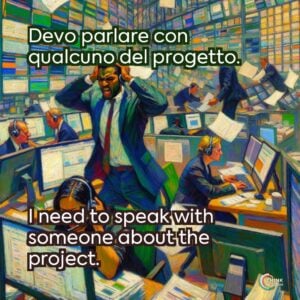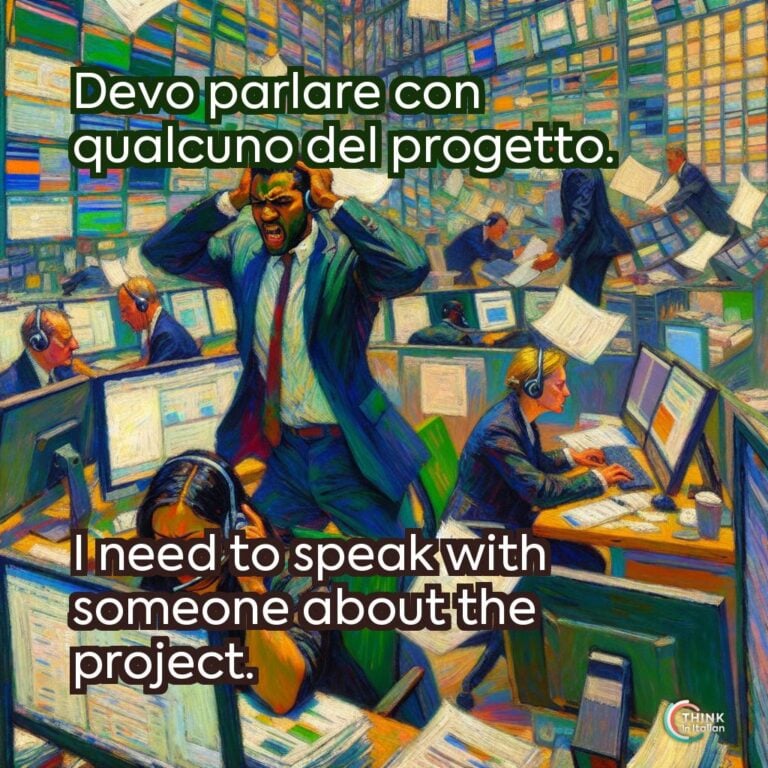Indefinite Expressions in Italian
In both English and Italian, indefinite expressions allow to convey a sense of uncertainty. However, the way each language handles this vagueness is different.
An example of these expressions are indefinite pronouns like qualcuno (someone), nessuno (no one), qualcosa (something), niente (nothing).
The easiest way you can convey a sense of vagueness in English is by means of the indefinite adjective “some“, which corresponds to the Italian qualche.
However, while English makes use of this word in a very flexible way, Italian requires a more context-specific approach to vagueness. This means that qualche doesn’t always map directly onto the English “some”.
Here, I will guide you through different ways you can translate all those expressions that are composed of “some” and another term, be it a noun or a pronoun, as in “somewhere”, “somewhat”, or “sometime”…
“Some” in Italian
As I mentioned before, some in Italian is translated as qualche. In English, “some” can be applied almost universally to indicate an indefinite quantity or quality.
The Italian equivalent qualche, instead, has a limited use case and doesn’t cover all the indefinite meanings that “some” can convey in English.
In most of the cases, it requires the use of a preposition to fulfil the meaning it aims at conveying. For instance, have a look at the sentence below:
Simona è uscita per andare da qualche parte.
Simona left to go somewhere.
By examining how “some” is combined with other words, like “where”, “how”, and “time”, we can explore how these expressions translate into Italian and how the concept of vagueness is managed in the language.
Let’s break down how “some” functions with different expressions in English and how qualche or other Italian expressions translate these meanings.
Combinations With “Qualche”
Somewhere in Italian
In English, the word “somewhere” implies an unspecified location. Italian translates this as da qualche parte. While the concept is similar, Italian often requires a bit more mental effort in terms of context.
As you can see, it makes use of the indefinite adjective qualche, but it also requires the preposition di and the noun parte.
Ho lasciato il libro da qualche parte.
I left the book somewhere.
Somewhat in Italian
In English, “somewhat” is used to describe degree, such as a slight amount or intensity. To express this concept, Italian uses un po’.
Sono un po’ stanco oggi.
I’m somewhat tired today.
Somehow in Italian
The word “somehow” in English specifically refers to an unspecified or unclear manner of accomplishing something. Italian makes use of the expression in qualche modo to convey this meaning, as in the following example:
In qualche modo, riusciremo a farlo.
Somehow, we’ll manage to do it.
As you might have noticed, this is structurally very similar to the Italian counterpart of “somewhere”, as it is composed of a preposition, qualche, and another word that is semantically linked to the purpose of the expression.
Sometime in Italian
“Sometime” in English carries the dual meaning of an unspecified time in the future or occasional instances. Italian has two different translations for that.
When referring to an indefinite time in the future, you can use prima o poi. This expression translates literally to “sooner or later”, but it captures the essence of a vague point in time. For example:
Prima o poi andrò in Italia.
I’ll go to Italy sometime.
For occasional instances, again we use qualche, specifically the expression qualche volta, which translates to “sometimes” or “occasionally”, as in:
Qualche volta vado al cinema.
I go to the cinema sometimes.
Someone, Somebody, Something in Italian
The concepts of “someone” and “something” in Italian are captured by the indefinite pronouns qualcuno and qualcosa. Unlike all the other expressions we saw so far, here Italian has unique and direct terms to express these meanings.
Qualcuno is used to refer to an unspecified person, encompassing both the English words “someone” and “somebody. Qualcosa expresses the idea of an indefinite object, event, or matter, just like “something” in English.
Qualcuno ha bussato alla porta.
Someone knocked at the door.
Ho bisogno di qualcosa per il mal di gola.
I need something for my sore throat.
Learning Indefiniteness in Italian
From a linguistic perspective, the Italian language leans towards specificity, even in situations where vagueness is involved. As you learned, qualche is one of those words that shows how Italian handles indefiniteness based on the context.
While in English we have unique words that make use of the combination of “some” with other terms, Italian cannot always directly translate those.
For me, as a language learner and instructor, this clarity within vagueness is one of the most fascinating aspects of Italian. The language doesn’t allow you to drift too far into ambiguity.
Instead, it asks you to anchor your expressions, providing just enough clarity to guide the listener without giving away all the details.
Understanding how to use these expressions, especially “qualche,” is key to mastering the subtleties of the Italian language. It’s this balance of clarity within vagueness that makes Italian both challenging and rewarding to learn.








